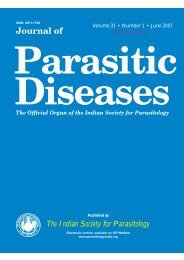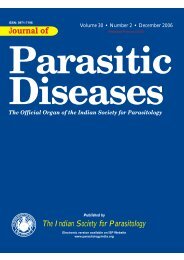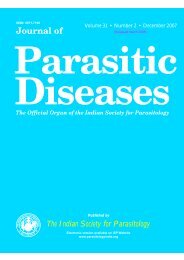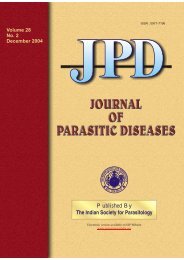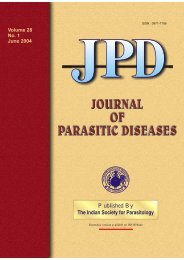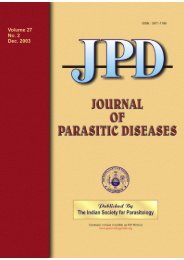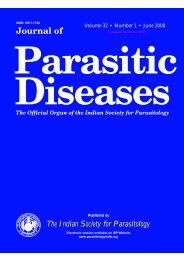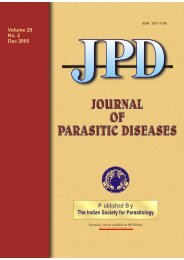44Sangwan and Sangwanpathogenic mechanism of peroxidative damage tolipid membranes (Gordeuk et al., 1987). <strong>The</strong> extent ofinjury depends on the antioxidant status of the animal,particularly its vitamin E status (Omara and Blakeley,1993; Ibrahim et al., 1997). Caeruloplasmin, a coppercontaining protein, has also been reported to provideantioxidant defences by scavenging free-iron andfree-radicals (Saneko et al., 1994).In summation, clinical signs in terms of anaemia, lowlevels of iron in whole blood and erythrocytes and thepresence of high concentrations of iron in liver andspleen suggest that T. annulata can harm its host bydisrupting the normal functioning of liver and spleen,upon which effective protective immune responsesand biochemical mechanisms depend. So, it isimportant not to supplement <strong>The</strong>ileria-infectedanimals with iron, but rather give them other nutrientswhich help in preventing the oxidative damage (suchas vitamin E) and better utilization of iron <strong>for</strong>erythropoiesis.ACKNOWLEDGEMENTSThis work was carried out at CCS HaryanaAgricultural University, Regional Research Station,Uchani, Karnal, and was financially supported by theNational Agricultural Research Project of the <strong>Indian</strong>Council of Agricultural Research.REFERENCESDunkan L (Edt.).1976. Chemical Analysis by AtomicAbsorption Spectrophotoscopy. (Third Ed). Lea andFebiger, Philadelphia.Forsyth LMG, Minns FC, Kirvar E, Adamson RE, Hall FR,McOrist S, Brown CGD and Preston PM.1999. Tissuedamage in cattle infected with <strong>The</strong>ileria annulataaccompanied by metastasis of cytokine-producing, schizontinfected mononuclear phagocytes. Journal of ComparativePathology. 120:39-57.Georgievskii VI, Annenkov BN and Samokin VI (Eds.).1982.Studies in the Agricultural and Food Sciences. MineralNutrition of Animals. Butterworths, London, pp 171-224.Gill BS, Bhattacharyulu Y and Kaur D.1997. Symptoms andpathology of experimental bovine tropical theileriosis(<strong>The</strong>ileria annulata infection). Annales de Parasitologie.52:597-608.Gordeuk VR, Bacon BR and Brittenham GM. 1987. Ironoverload: Cause and consequences. Annual Review ofNutrition. 7:485-508.Green LE, Berriatua E and Morgan KL.1993. Anaemia inhoused lambs. Research in Veterinary Science. 54:306-311.Ibrahim W, Lee V-S, Ye C-C, Szabo J, Bruckner G and ChowCK. 1997. Oxidative stress and antioxidant status in mouseliver: effects of dietary lipid, vitamin E and iron. Journal ofNutrition. 127:1401-1406.Hooshmand-Rad P.1976. <strong>The</strong> pathogenesis of anaemia in<strong>The</strong>ileria annulata infection. Research in VeterinaryScience. 20:324-329.Kent G and Bahu RM. 1979. Iron overload. In: MacSweenRNM, Anthony PP and Schewr PJ (Eds). Pathology of theliver. Churchill Livingstone, Edinburgh, pp 148-163.Kreutzer M and Kirchgessner M.1991. Endogenous ironexcretion: a quantitative means to control iron metabolism.Biology of Trace Element Research. 29:77-92.Naessens J, Grab DJ, Fritisch G.1996. Characterization ofbovine transferring receptor on normal activated andThieleria parva trans<strong>for</strong>med lymphocytes by a newmonoclonal antibody. Veterinary Immunology andImmunopathology. 52:65-76.National Research Council.1988. Nutrient Requirements ofDairy Cattle. Sixth Ed. National Academy of Science.Washington, D.C., USA.Omara FO and Blakeley BR. 1993. Vitamin E is protectiveagainst iron toxicity and iron-induced hepatic vitamin Edepletion in mice. Journal of Nutrition. 123:1649-1655.Omer OH, El-Malik KH, Magzoub M, Mahmoud OM,Haroun EM, Hawas A and Omar HM. 2003. Biochemicalprofiles in Friesian cattle naturally infected with <strong>The</strong>ileriaannulata in Saudi Arabia. Veterinary ResearchCommunication. 27:15-25.Preston PM, Brown CGD, Bell-Sakyi LJ, Richardson W andSanderson A. 1992. Tropical theileriosis in Bos Taurus andBos indicus calves. Response to infection with graded dosesof sporozoites. Research in Veterinary Science. 53:230-243.Purnell RE. 1978. <strong>The</strong>ileria annulata as a hazard to cattle in thecountries on the northern Mediterranean littoral. VeterinaryResearch Communication. 2:3-10.Sahu PK, Misra SC, Panda DN and Mohapta M. 1996.Haematological and biochemical alterations in <strong>The</strong>ileriaannulata infected cross-bred cattle. <strong>Indian</strong> VeterinaryJournal. 73: 995-997.Saneko EL, Yaroplov AI and Harris ED. 1994. Biologicalfunctions of caeruloplasmin expressed through copperbindingsites. Journal of Trace Elements and ExperimentalMedicine. 7: 69-88.Schalm OW, Jain NC and Caroll EJ (Eds.). 1975. VeterinaryHaematology. Third Ed., Lea and Fabiger, Philadelphia.Snedecor GW and Cochran WJ.1967. Statistical Methods.Seventh Ed. Ox<strong>for</strong>d and IBG Publishing Co., New Delhi.Underwood EJ and Suttle NF. 1999. <strong>The</strong> Mineral Nutrition ofLivestock. Third Ed., CAB International Publishing Co. p361.Watanabe K, Ozawa M, Ochiai H, Kamohara H, Lijima N,Negita H, Orino K and Yamamoto S. 1998. Changes in ironand ferritin in anaemic calves infected with <strong>The</strong>ileriasergenti . Journal of Veterinary Medical Science. 60:943-947.Weinberg ED. 1984. Iron withholding: a defence againstinfection and neoplasia. Physiological Reviews. 64:65-102.
Journal of Parasitic Diseases: June 2006, Vol. 30, No. 1, 45–52J P DMosquito breeding in riceland agro-ecosystem nearChennai, Tamil Nadu, India1 2J. Ravindran and J. Williams1Integrated Disease Vector Control Project (National Malaria Research Institute), Field Station, Chennai.2P. G. and Research Department of Zoology, Loyola College, Chennai.ABSTRACT. Breeding ecology of mosquitoes was studied in riceland area near Chennai during theperiod 1992-1999. <strong>The</strong> study area was a transition zone with withdrawal of intense agriculturalactivities to facilitate urbanization. A myriad of mosquitoes including potential vectors of malariaand Japanese encephalitis (JE) were observed breeding in various habitats present. A longitudinalsurvey showed no malaria vector breeding in rice fields. Extensive breeding of Culextritaeniorhynchus (JE vector) was observed. Natural breeding pattern indicated peak anophelineand culicine density during first two weeks after transplantation. Pre- and post-monsoon surveysin irrigation wells indicated breeding of 16 species of mosquitoes. Both Anopheles stephensi and An.culicifacies, the urban and rural malaria vectors, respectively, were encountered breeding in thewells; An. stephensi breeding was predominant. Observations on species-specific habitatpreferences showed An. stephensi to breed extensively in open wells and An. culicifacies inpuddles/bed pools. Cx. tritaeniorhynchus was found breeding in almost all types of habitatssurveyed. In retrospective, the study revealed in<strong>for</strong>mation on mosquito species breeding in varioushabitats, which may be helpful <strong>for</strong> optimizing species sanitation.Keywords: breeding habitats, immature stages, vectorsINTRODUCTIONRice is the staple food in India, and its cultivation hasbeen traditionally carried out under differentgeographical and climatic conditions (Singh et al.,1989). Modern irrigation facilities and plant breedingtechnologies have resulted in increased acreage andcultivation of rice crops throughout the year leading toits increased production. Un<strong>for</strong>tunately, along withincreased production it has also led to widespreadoutbreaks of mosquito borne diseases like malaria andJapanese encephalitis (JE; Lacey and Lacey, 1990).Corresponding author: Dr. K. John Ravindran, IntegratedDisease Vector Control Project (NMRI), 332-A, SpartanSchool Road, Paneer Nagar, Mogappair, Chennai-600 037,Tamil Nadu, India. E-mail: johnravindran@gmail.comFor their breeding, mosquitoes are known to exploitaquatic habitats present in riceland agro-ecosystem.Any change in this ecosystem, either naturally or manmade, tend to alter the biotic community includingmosquitoes, which may be advantageous ordisadvantageous <strong>for</strong> mankind. <strong>The</strong>re<strong>for</strong>e, in<strong>for</strong>mationon mosquito fauna and breeding ecology in atransitory environment is imperative <strong>for</strong> successfulintervention. Ongoing urbanization in agriculturalarea in the outskirts of Chennai, Tamil Nadu, India,resulted in an ecologically transitional region, whichreceived our attention. In<strong>for</strong>mation on breedingecology of mosquitoes in this environment may behelpful to ensure preparedness <strong>for</strong> effective vector anddisease control.



